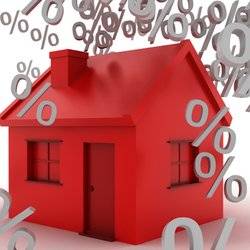The housing slowdown surprised economists, who had expected a seasonal pickup. Before Congress last week, Federal Reserve Chair Janet Yellen said the housing slowdown might well last longer than expected, especially with sluggish housing formation from young adults who are currently facing large student debt and living with their parents to reduce costs.
Yellen said to the Joint Economic Committee last week:
“My expectation is that as the job market strengthens … we’ll see household formation pick up, but it’s hard to know here what exactly the new normal is.”
New home sales fell 14.5% in March compared to February, while February existing home sales had dropped to a 19-month low.
US GDP growth in Q1 2014 was very low, at just 0.1% (annualized) versus 2.6% in Q3 2013, according to the Bureau of Economic Analysis. It was the smallest quarterly gain since the fourth quarter of 2012.
Fewer household formations today

Over a twelve-month period ending in March 2014, a total of 423,000 new households were formed, much lower than the 1.3 million-per-year average from 2002 to 2006, according to data from the Census Bureau.
A USA Today survey of forty top economists found that they do not expect the rebound, which started three years ago, to reverse course’ they were more concerned about the housing recovery now compared to six months ago.
Most of the economists believe the housing recovery will be more moderate this year.
In an interview with USA Today, Stuart Hoffman, a PNC Financial Services Group economist, says he expects the housing market will recover some lost ground this year as job growth brings in more house seekers who qualify for mortgages.
Faster GDP growth may help housing market
President of the Federal Reserve of Atlanta, Dennis Lockhart, said in Dubai last week that US GDP may grow 3% in Q2 2014. He believes the housing market will pick up after its recent lull.
Lockhart said:
“It is little early to say based on data. But I am pretty confident it will be at or exceed 3 percent in the second quarter. Generally, I see the housing market improving and contributing to this picture of a better economy.”
According to the OECD’s Better Life Index, out of 11 categories Americans place housing as number 8 in their list of priorities, after (in order) life satisfaction, health, education, work-life-balance, environment, safety, and jobs.

